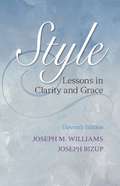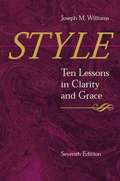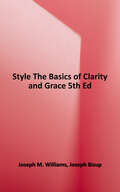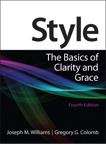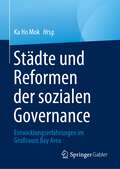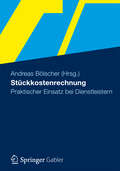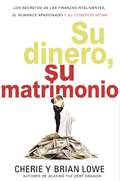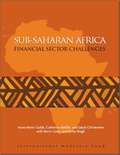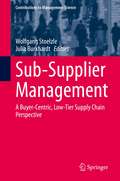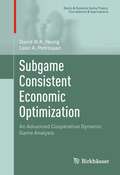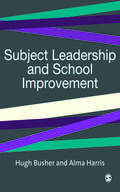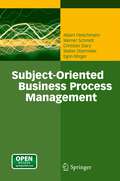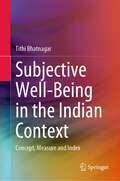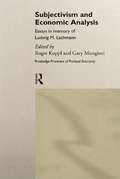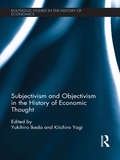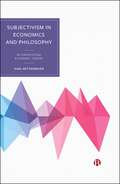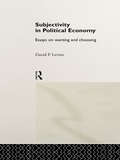- Table View
- List View
Style: Lessons in Clarity and Grace Eleventh Edition
by Joseph M. Williams Joseph BizupWilliams' own clear, accessible style models the kind of writing that audiences-both in college and after-will admire. The principles offered here help writers understand what readers expect and encourage writers to revise to meet those expectations more effectively. This book is all you need to understand the principles of effective writing.
Style: The Basics of Clarity and Grace
by Joseph Bizup Joseph WilliamsStyle: The Basics of Clarity and Grace reflects the wisdom and clear authorial voice of Williams' best-selling book, Style: Lessons in Clarity and Grace, while streamlining every chapter to create a very brief, yet powerfully direct guide to writing with style. The concise clarity of this book makes it a handy reference for anyone interested in good writing--as well as a quick and ideal guide for freshman composition courses, writing courses across the disciplines, and as a supporting text in courses that require clear and direct writing. Style: The Basics covers the elemental principles of writing that will help students diagnose the strengths and weaknesses of their prose quickly and revise effectively. The text features principles of effective prose written in Williams' hallmark conversational style, offering reason-based principles, rather than hard and fast rules, for successful, effective writing.
Style: The Basics of Clarity and Grace (4th Edition)
by Joseph M. Williams Gregory G. ColombStyle: The Basics of Clarity and Grace reflects the wisdom and clear authorial voice of Williams' best-selling book, Style: Lessons in Clarity and Grace, while streamlining every chapter to create a very brief, yet powerfully direct guide to writing with style. The concise clarity of this book makes it a handy reference for anyone interested in good writing.
Styling Jim Crow: African American Beauty Training During Segregation
by Julia Kirk BlackwelderStyling Jim Crow focuses on the beauty education industry in racially segregated communities from World War I through the 1960s. In this study of two black beauty companies of the Jim Crow era, Julia Kirk Blackwelder looks at the industry as a locus of black entrepreneurial effort and an opportunity for young women to obtain training and income that promised social mobility within the African American community. Blackwelder demonstrates that commerce, gender norms, politics, and culture all intersected inside African American beauty schools of the Jim Crow era. The book centers on Marjorie Stewart Joyner of the Madam C. J. Walker beauty chain and James H. Jemison of the Franklin School of Beauty, two educators who worked throughout their business lives to liberate women from the clutches of racial prejudices. They stood at the helms of enterprises that brought self-reliance and pride of accomplishment to generations of African Americans. <P><P> In Blackwelder’s well-documented story and clearly argued analysis, the history of African American beauty education shows how succeeding generations of black women, in the face of seemingly overwhelming odds, freed themselves from a life of service to whites and advanced into dignified economic independence though work that they and their clients valued for its intangible worth.
Stylish Weddings for Less: How to Plan Your Dream Wedding on a Budget
by Catherine SabinoSTYLISH WEDDINGS FOR LESS is a step-by-step timeline, with real life examples, resources and practical tips, will help you plan a beautiful but budget friendly wedding, from the dress to the honeymoon.
Stylish Weddings: Create Dramatic Wedding Photography In Any Setting
by Kevin JairajKevin Jairaj is one of the best-regarded wedding photographers in the industry. His clients have fallen for his dramatic, fashion-inspired shots of every phase of the wedding day. Jairaj has also inspired countless photographers to take risks, take control, and take their image-making to the next level. In this book, Jairaj guides readers through the creation of 60 of his breathtaking images, as well as alternate shots for that scene, to educate readers on what it takes to create technically masterful photographs that magically and artfully capture the spirit of the wedding day. The book is equal parts technique and artistry; readers will learn how to recognize what constitutes a good shot, how to find perfect lighting (or produce it, when perfect light is not at-the-ready), how to create dynamic poses, and how to anticipate those can’t-miss moments that every bride and groom will want to remember their wedding day by. The book is broken down into four discrete sections, each with a unique focus: Brides, Couples, Details, and Moments. Readers can opt to delve into an area of focus that they are feeling particularly challenged by and find concrete approaches an insightful strategies to make their own with their own clients. In each section, readers will discover details on using a wide range of lighting approaches (natural light, strobes, video lights, speedlights, and window light). They will find an array of striking, evocative poses and compositions that draw the viewer into the image. They will also learn how and where to shoot from during every phase of the shoot--from the bridal preparations, to the ceremony, to the first dance, to the exit. Armed with these solid technical skills and artistic inspirations, readers will approach their own clients’ weddings with increased confidence and heightened creativity.
Städte und Reformen der sozialen Governance: Entwicklungserfahrungen im Großraum Bay Area
by Ka Ho MokIn diesem Buch wird kritisch untersucht, wie die chinesische Regierung die neun Städte und zwei Sonderverwaltungsregionen in der Greater Bay Area (GBA) in Südchina proaktiv für eine engere Zusammenarbeit gewonnen hat, um das Land von der "Weltfabrik" zu einer führenden Weltwirtschaft in Sachen Innovation und Unternehmertum zu machen. Während der Großteil der bisherigen Forschung zu Chinas GBA-Entwicklung die Perspektive des wirtschaftlichen und technologischen Fortschritts einnimmt, konzentriert sich dieses Buch auf kritische Überlegungen dazu, wie sich die Forderung nach der Entwicklung von Megastädten und einer vertieften regionalen Zusammenarbeit in der Bay Area auf die Lebensgrundlagen der Menschen, die soziale Integration und die städtische Verwaltung auswirken wird. Das zentrale Thema dieses Buches ist "Städte, sozialer Zusammenhalt und Governance". Basierend auf der Analyse von Politischen Maßnahmen und Dokumenten, Feldforschung und Umfragen aus erster Hand sowie detailierten Interviews mit wichtigen Akteuren, die die Entwicklung der Greater Bay Area vorantreiben, bietet dieses Buch nicht nur eine regionale Perspektive bei der Analyse der Entwicklung der Greater Bay Area durch den Vergleich und die Gegenüberstellung von Entwicklungserfahrungen in den verschiedenen Bucht-Ökonomien des Landes wie der Shanghai und Zhejiang Bay Area und der Beijing und Bohai Bay Area. Das vorliegende Buch zieht auch vergleichende und internationale Erkenntnisse aus anderen etablierten Bucht-Volkswirtschaften wie der Tokyo Bay, der Florida Bay und den New York Bay Areas heran, um die Entwicklung der GBA in China zu analysieren.
Störfaktor Chef: Ein Spiegel für Chefs von heute, für eine bessere Führungskultur von morgen
by Klaus G. BeckSie sind davon überzeugt, dass Chefs in Unternehmen alles gut im Griff haben? Dass sie Kompetenz ausstrahlen, dass sie die Menschen im Unternehmen motivieren, dass sie angemessen kommunizieren, Innovation fördern und vor allem, dass sie vorbildlich die Unternehmenswerte verkörpern? Wenn Sie das wirklich so sehen oder gar erleben durften, dann legen Sie dieses Buch am besten wieder weg. Der Autor hat jedenfalls andere Erfahrungen gemacht, die er hier in treffenden Beispielen aus verschiedenen Unternehmen beschreibt. Eine Kernaussage besteht darin, dass der Laden läuft, weil die Menschen im Unternehmen n i c h t das machen, was Chefs von ihnen erwarten. Die Basis der operativ arbeitenden Menschen gleicht den „Störfaktor Chef“ aus. Ziel des Buchs ist es aber nicht zu lästern, sondern Lösungen aufzuzeigen. Klaus G. Beck zeigt ganz praxisnah auf, was im Alltag zu weniger Chef- und zu mehr Kundenorientierung führt und wie Führen durch innere Motivation gelingen kann. Eine inspirierende Lektüre mit vielen wertvollen Tipps. Es geht um ESELhaft vorgegebene Ziele, die Seilschaft der Inkompetenz, den erfolgreichen Weg in die Trägheit, die Schwelle des verschlafenen disruptiven Wandels, das hierarchiebasierte Chef-Paradoxon, Regeln für den konstruktiven Streit, die cheflose Entscheidung, den SALV-Zyklus, Singapur-Gleichungen, … All diese Begriffe erklärt das Buch ausführlich. Am Ende erreichen wir mit der „vollständigen Prozessorganisation“ und dem „Teamcoach-Gedanken“ eine zeitgemäße Organisationsform und einen modernen Führungsstil, mit dem „Führen durch innere Motivation“ wirklich möglich wird.
Stückkostenrechnung
by Andreas BölscherIn der fertigenden Industrie sind Stückkostenrechnungsmodelle weit verbreitet und in entsprechender Standardsoftware abgebildet. Aufgrund typisch hoher Strukturkostenanteile in Dienstleistungsunternehmen sind Stück- oder Produktkostenrechnungssysteme dagegen eher selten anzutreffen. Gerade hier ist es aber aufgrund des globalen Wettbewerbs und der einhergehenden Standardisierung und Industrialisierung der Dienstleistungserstellung erforderlich, die Stückkosten der Dienstleistungsproduktion zu senken. Produktivitätskennzahlen als Input-Output-Beziehungen und finanzielle Kennzahlen z.B. im Rahmen der Kostenstellenrechnung bieten dabei nicht das gleiche wie Stück- oder Produktkostenrechnungsmodelle. Heute sind Business Intelligence-Applikationen verfügbar, die diese Produktkostenrechnungsmodelle vergleichsweise leicht administrierbar machen, den besonderen Anforderungen der Dienstleistungsorganisationen aber dennoch gerecht werden. Zudem unterstützen diese Stück-/Produktkostenrechnungsmodelle die Kalkulation von internen und externen Dienstleistungen, die früher ebenfalls in Dienstleistungsorgansiationen so einfach nicht möglich waren. Dieses Buch widmet sich diesem gleichermaßen aktuellen wie relevanten Themenkomplex.
Su dinero, su matrimonio: Los secretos de las finanzas inteligentes, el romance apasionado y su conexión íntima
by Cherie Lowe Brian LoweEste libro le guía en un proceso liberador para remendar su corazón y, al mismo tiempo su cuenta bancaria.La visión de Dios para su matrimonio dista mucho de ser mediocre, y el dinero y las relaciones sexuales son dos de los más comunes puntos de tensión. Pero no tiene por qué ser así.En Su dinero, su matrimonio, Brian y Cherie Lowe le ofrecen explicación directa y principios poderosos para poner en orden sus finanzas a fin de que ustedes puedan volver a su romance. Apréndalo de ellos: Los Lowe resolvieron una deuda de US$127.000 en apenas cuatro años, y emergieron, no solo financieramente libres, sino también mucho más unidos.Acompañe a Cherie, bloguera de finanzas personales en Queen of Free, y a Brian, abogado de familia que lo ha visto todo en lo que se trata de batallas maritales por dinero, en esta jornada para ayudarle a usted y a su cónyuge a pasar de diferentes libros a estar en la misma página. Mediante relatos cándidos y divertidos, ideas frescas y prácticas, y unas cuantas arrugas en el camino, Brian y Cherie relevan los secretos del “juego previo financiero” capaz de ayudar a todo matrimonio a prosperar juntos por igual en las finanzas y el romance.Usted aprenderá cómo:Cultivar “paciencia apasionada” para ahorrar para el futuroIdentificar hábitos financieros insalublesAhorrar con inteligencia en las salidasSortear el camino por expectativas mal alineadas como parejaVencer el juego de la comparaciónCultivar una relación personal más fuerte en un presupuesto de cero dólares.Los matrimonios comparten mucho más que una chequera o incluso un dormitorio; comparten una unión sagrada. Imagínese lo que su matrimonio podría ser si pudieran dejar atrás los conflictos monetarios. Este libro es una invitación para hallarlo, y para prosperar juntos.
Suave
by Mark S. AlbionPromotes discussion on advertising budgeting and media mix decisions in the shampoo market for low-priced, high-volume Suave. Provides various types of market research into consumer behavior and the competition context. The importance of retailers and shelf space is emphasized, and the entire marketing budget is examined.
Sub-Saharan Africa
by Sanjeev Gupta Kevin Joseph Carey Ulrich JacobyA report from the International Monetary Fund.
Sub-Saharan Africa Growth, Savings, and Investment, 1986-93
by Michael T. Hadjimichael Roger Nord Martin Mühleisen Dhaneshwar Ghura E. Murat UçerThis paper assesses the economic performance during 1986-93 of sub-Saharan African countries as a group and of selected analytical subgroups of countries.
Sub-Saharan Africa's Integration in the Global Financial Markets
by John Wakeman-Linn Smita Wagh Gustavo Ramirez Corinne DeléchatA report from the International Monetary Fund.
Sub-Saharan Africa: Financial Sector Challenges
by International Monetary FundThe financial sectors of low-income sub-Saharan Africa countries are among the world's least developed, and there is an urgent need to build efficient and sound financial markets in order to promote economic development, entrepreneurship and poverty reduction objectives. Based on a review of the key features of financial systems, this publication considers the main obstacles and challenges involved in implementing a financial reform agenda in order to improve the economic prospects of the region.
Sub-Supplier Management: A Buyer-Centric, Low-Tier Supply Chain Perspective (Contributions to Management Science)
by Wolfgang Stoelzle Julia BurkhardtThis book highlights the latest research on sub-supplier management while also discussing its current state and related managerial challenges. It provides a process framework for managing sub-suppliers and an overview of the various buyer / sub-supplier relationships and their key characteristics. Furthermore, the respective chapters address essential capabilities to successfully manage sub-suppliers and to discuss how to overcome barriers and challenges associated with sub-supplier management. Concrete examples and cases are also provided, and, in closing, potential research opportunities are outlined and demonstrated.
Subgame Consistent Economic Optimization: An Advanced Cooperative Dynamic Game Analysis (Static & Dynamic Game Theory: Foundations & Applications)
by Leon A. Petrosyan David W.K. YeungVarious imperfections in existing market systems prevent the free market from serving as a truly efficient allocation mechanism, but optimization of economic activities provides an effective remedial measure. Cooperative optimization claims that socially optimal and individually rational solutions to decision problems involving strategic action over time exist. To ensure that cooperation will last throughout the agreement period, however, the stringent condition of subgame consistency is required. This textbook presents a study of subgame consistent economic optimization, developing game-theoretic optimization techniques to establish the foundation for an effective policy menu to tackle the suboptimal behavior that the conventional market mechanism fails to resolve.
Subject Leadership and School Improvement (Published in association with the British Educational Leadership and Management Society)
by Alma Harris Hugh Busher Christine WiseCurriculum and subject leadership in schools has recently gained substantial attention from both researchers and policy-makers. The Teacher Training Agency (TTA) has reinforced the importance of subject leadership in school improvement, proposing a new measure of such leadership competence through the creation of national subject leader standards (NPQSL). Subject Leadership and School Improvement reflects critically on the work of subject and curriculum leaders especially in schools in England and Wales, that is, those within the policy framework of The National Curriculum and the Teacher Training Agency. The book debates the functions of subject leaders in primary and secondary schools, using current research-based conceptual frameworks, and considers how they can bring about improvement and change with their colleagues in their subject areas. It emphasizes what is particular about leading and managing the middle realm of education organizations, showing how structural, cultural and individual imperatives and perspectives interact with each other in the professional practice of being a subject leader. The book is of interest not only to subject leaders and curriculum co-ordinators, to help them reflect rigorously on their practice, but also to those responsible for supervising them, such as headteachers and school governors, as well as for those accountable to them. It will be a useful text for serving teachers undertaking higher degrees programmes or programmes for gaining national standards qualifications, the National Professional Qualification for Headteachers (NPQH) as much as for the NPQSL (National Professional Qualification for Subject Leaders) when it is implemented.
Subject-Oriented Business Process Management: Second International Conference, S-bpm One 2010, Karlsruhe, Germany, October 14, 2010 Selected Papers (Communications In Computer And Information Science #138)
by Werner Schmidt Albert Fleischmann Christian Stary Egon Börger Stefan ObermeierActivities performed in organizations are coordinated via communication between the people involved. The sentences used to communicate are naturally structured by subject, verb, and object. The subject describes the actor, the verb the action and the object what is affected by the action. Subject-oriented Business Process Management (S-BPM) as presented in this book is based on this simple structure which enables process-oriented thinking and process modeling. S-BPM puts the subject of a process at the center of attention and thus deals with business processes and their organizational environment from a new perspective, meeting organizational requirements in a much better way than traditional approaches. Subjects represent agents of an action in a process, which can be either technical or human (e.g. a thread in an IT system or a clerk). A process structures the actions of each subject and coordinates the required communication among the subjects. S-BPM provides a coherent procedural framework to model and analyze business processes: its focus is the cooperation of all stakeholders involved in the strategic, tactical, and operational issues, sharing their knowledge in a networked structure. The authors illustrate how each modeling activity through the whole development lifecycle can be supported through the use of appropriate software tools. The presentation style focuses on professionals in industry, and on students specializing in process management or organizational modeling. Each chapter begins with a summary of key findings and is full of examples, hints, and possible pitfalls. An interpreter model, a toolbox, and a glossary summarizing the main terms complete the book. The web site www.i2pm.net provides additional software tools and further material.
Subjective Well-Being in the Indian Context: Concept, Measure and Index
by Tithi BhatnagarThis book offers an understanding of subjective well-being (SWB) in the Indian context across ages and strata. It discusses the conceptualization and measurement of both subjective well-being (SWB) and subjective ill-being (SIB) through a multi-phased research study. The structure of SWB and development, standardization, and indexing of an SWB Measure provide insights on how the SWB Measure can enable nations to find out the national level of SWB/SIB for its citizens. The index may be useful in identifying the level of people’s well-being or ill-being. It explores the possibility of implications and interventions in optimizing SWB both at the individual and collective levels. It is a consolidated account of the work done in SWB research, particularly with a cultural focus from the Indian context. This book has a wide application for students, researchers, psychometricians, practitioners, policymakers, and all individuals interested in concepts like SWB and Happiness.
Subjectivism and Economic Analysis (Routledge Frontiers Of Political Economy Ser. #Vol. 21)
by Roger Koppl Gary MongioviSubjectivism plays a fundamental role in many of the leading alternative schools in economics. This work explores major methodological issues in the area of radical subjectivism and includes contributions from Jorg Bibow, Peter Boettke, Maurizio Caserta, Steven Horwitz, Brian J. Loasby, Steven Parsons, Steve Sullivan and Carlo Zappia.
Subjectivism and Objectivism in the History of Economic Thought (Routledge Studies In The History Of Economics Ser.)
by Kiichiro Yagi Yukihiro IkedaThis book investigates the tensions between subjectivism and objectivism in the history of economics. The book looks at the works of Adam Smith, Carl Menger, Leon Walras, William Stanley Jevons, Oskar Morgenstern, Ludwig Mises, Piero Sraffa, and so on. The book highlights the diverse subjective and objective elements of their economic theories and suggests a reframing of methodology to better address the core problems of the theories. Contributors of the volume are leading members of the Japan Society of History of Economic Thought who have provided a comprehensive overview on the economics methodology and the related problems. Hence, this book will be of an invaluable asset to not only those who are interested in the history of economic thought, but also to scholars who are concerned with the methodological problems of economic science.
Subjectivism in Economics and Philosophy: Re-orientating Economic Theory
by Karl MittermaierAvailable open access digitally under CC-BY-NC-ND licence. Following on from The Hand Behind the Invisible Hand and A Realist Philosophy of Economics, this new book drawn from Karl Mittermaier’s writings examines the intricate relationship between economic theory and real-world economic experiences. Despite the centrality of subjectivism in both philosophy and economics, these fields have often overlooked each other's insights. Mittermaier challenges this disconnect, advocating for a shift from deterministic models to a more reflective approach in economics. He examines the historical, methodological and philosophical dimensions of economic theory, highlighting its struggle to connect economic theory to empirical data and individuals' lived experiences. Originally penned between 1979 and 1982 and now published posthumously, this work remains a crucial contribution to contemporary economic discussions.
Subjectivity in Political Economy: Essays on Wanting and Choosing (Routledge Frontiers of Political Economy #Vol. 18)
by David P. LevineThis book explores the way political economy understands human motivation. In it, the author argues that the assumptions typically made by economists regarding want and choice cannot adequately lay a foundation for answering important questions about the design of economic institutions and the appropriate use of markets. This volume offers an exciting and unusual contribution to political economy, offering a novel integration of the insights of political economy, philosophy, and psychology, applying them to vital foundational issues in political economy.
